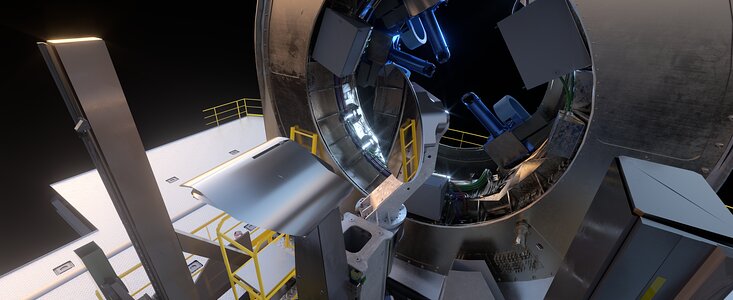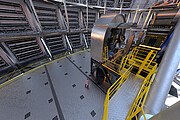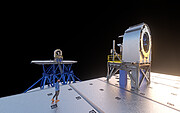Annuncio
Firmato il contratto per la seconda stazione prefocale dell'ELT, il progetto per la prima è vicino all'approvazione
06 Novembre 2020
Mentre si avvicina la conclusione della revisione finale del progetto di un componente importante dell'ELT (Extremely Large Telescope) dell'ESO, la sua prima stazione prefocale o PFS-A, l'ESO ha firmato un contratto con la società spagnola IDOM per una seconda stazione prefocale, PFS-B.
Le due stazioni prefocali per ELT, progettate e prodotte da IDOM, sono grandi strutture di oltre 9 metri di altezza, posizionate ciascuna su una delle piattaforme di supporto poste ai lati opposti della struttura principale del telescopio. Poste all'interfaccia tra il sistema a cinque specchi del telescopio e i suoi strumenti, hanno una triplice funzione: controllare l'allineamento degli specchi del telescopio (incluso il puntamento della struttura del telescopio verso il punto preciso in cielo), garantire che lo specchio principale segmentato continui a funzionare come un unico specchio e distribuire la luce agli strumenti installati sul telescopio.
Utilizzare la luce delle stelle per controllare l'allineamento
L'ELT è estremamente sensibile a cambiamenti anche minimi delle condizioni ambientali, che possono rovinare l'allineamento degli specchi, degradando la qualità delle osservazioni. La gravità deforma gli specchi intanto che il telescopio si muove. Inoltre, piccoli cambiamenti di temperatura fanno possono far espandere leggermente la struttura metallica del telescopio, di qualche centinaio di micrometri, modificando la posizione dei vari specchi di ELT.
Le due stazioni PFS-A e PFS-B analizzano la luce delle "stelle guida", stelle naturali e luminose vicine all'oggetto di studio nel cielo. Le stazioni, che non lavorano contemporaneamente, potranno seguire fino a tre stelle guida durante le osservazioni, coadiuvate da tre bracci con sensori posizionati con precisione di poche centinaia di micrometri. Le informazioni provenienti dalle stelle guida vengono utilizzate per posizionare attivamente gli specchi e la struttura principale del telescopio per controllare l'allineamento del telescopio durante le osservazioni, un processo noto come ottica attiva. Ciò garantisce che la luce rimanga correttamente focalizzata e che il telescopio rimanga puntato con precisione sul bersaglio durante le osservazioni.
798 segmenti che agiscono come un unico specchio
Una funzione aggiuntiva delle PFS è di garantire che le centinaia di segmenti dello specchio principale (M1) continuino a funzionare come un unico specchio gigante. Per ottenere ciò, le posizioni relative dei 798 segmenti dello specchio devono essere precise fino a decine di nanometri. Tuttavia, le posizioni dei segmenti si spostano nel tempo a causa delle variazioni di temperatura e dei carichi gravitazionali, quindi devono essere corrette periodicamente. La PFS controllerà regolarmente la forma di M1 utilizzando le misure delle stella guida per mantenerne la forma ottimale.
Distribuire la luce
Infine, le PFS vengono utilizzate anche per distribuire la luce raccolta dal telescopio ai vari strumenti scientifici e alle apparecchiature ausiliarie, a seconda del sistema in uso in ogni dato momento. Le piattaforme su cui sorgeranno le PFS A e B ospiteranno anche molteplici strumenti scientifici, specializzati nell'analisi della luce raccolta dal telescopio per rispondere a varie domande sull'Universo. Ogni PFS dirigerà la luce verso lo strumento scientifico selezionato utilizzando un grande specchio piatto. È l'ultimo componente ottico prima che la luce arrivi al fuoco del telescopio, e da questo deriva il proprio nome.
Una collaborazione di successo
Dopo due anni di lavoro da parte degli ingegneri dell'IDOM e dell'ESO sul complesso PFS-A, le equipe di lavoro sono ora molto vicine a una conclusione di successo delle attività di progettazione e presto inizieranno a produrre questo componente cruciale del telescopio. Inoltre l'ESO, rappresentato dal Direttore Generale Xavier Barcons, e l'IDOM, rappresentasto dal presidente Luis Rodríguez, hanno ora firmato un contratto che assegna all'azienda spagnola lo sviluppo e la fornitura della seconda stazione prefocale per l'ELT.
L'ELT dell'ESO, reso possibile da soluzioni ingegneristiche ad alta tecnologia e da molte persone di talento, risponderà alle più grandi domande astronomiche del nostro tempo, dall'indagine sulla storia dell'Universo alla ricerca e allo studio di pianeti simili alla Terra al di fuori del Sistema Solare. Il telescopio, costruito in cima al Cerro Armazones nel deserto cileno di Atacama, inizierà le operazioni verso la fine di questo decennio.
Contatti
Steffan Lewis
ESO
Garching bei München, Germany
Tel: +49 89 3200 6931
Email: slewis@eso.org
Bárbara Ferreira
ESO Public Information Officer
Garching bei München, Germany
Tel: +49 89 3200 6670
Email: pio@eso.org
Riguardo all'annuncio
| Identificazione: | ann20029 |
Our use of Cookies
We use cookies that are essential for accessing our websites and using our services. We also use cookies to analyse, measure and improve our websites’ performance, to enable content sharing via social media and to display media content hosted on third-party platforms.
ESO Cookies Policy
The European Organisation for Astronomical Research in the Southern Hemisphere (ESO) is the pre-eminent intergovernmental science and technology organisation in astronomy. It carries out an ambitious programme focused on the design, construction and operation of powerful ground-based observing facilities for astronomy.
This Cookies Policy is intended to provide clarity by outlining the cookies used on the ESO public websites, their functions, the options you have for controlling them, and the ways you can contact us for additional details.
What are cookies?
Cookies are small pieces of data stored on your device by websites you visit. They serve various purposes, such as remembering login credentials and preferences and enhance your browsing experience.
Categories of cookies we use
Essential cookies (always active): These cookies are strictly necessary for the proper functioning of our website. Without these cookies, the website cannot operate correctly, and certain services, such as logging in or accessing secure areas, may not be available; because they are essential for the website’s operation, they cannot be disabled.
Functional Cookies: These cookies enhance your browsing experience by enabling additional features and personalization, such as remembering your preferences and settings. While not strictly necessary for the website to function, they improve usability and convenience; these cookies are only placed if you provide your consent.
Analytics cookies: These cookies collect information about how visitors interact with our website, such as which pages are visited most often and how users navigate the site. This data helps us improve website performance, optimize content, and enhance the user experience; these cookies are only placed if you provide your consent. We use the following analytics cookies.
Matomo Cookies:
This website uses Matomo (formerly Piwik), an open source software which enables the statistical analysis of website visits. Matomo uses cookies (text files) which are saved on your computer and which allow us to analyze how you use our website. The website user information generated by the cookies will only be saved on the servers of our IT Department. We use this information to analyze www.eso.org visits and to prepare reports on website activities. These data will not be disclosed to third parties.
On behalf of ESO, Matomo will use this information for the purpose of evaluating your use of the website, compiling reports on website activity and providing other services relating to website activity and internet usage.
Matomo cookies settings:
Additional Third-party cookies on ESO websites: some of our pages display content from external providers, e.g. YouTube.
Such third-party services are outside of ESO control and may, at any time, change their terms of service, use of cookies, etc.
YouTube: Some videos on the ESO website are embedded from ESO’s official YouTube channel. We have enabled YouTube’s privacy-enhanced mode, meaning that no cookies are set unless the user actively clicks on the video to play it. Additionally, in this mode, YouTube does not store any personally identifiable cookie data for embedded video playbacks. For more details, please refer to YouTube’s embedding videos information page.
Cookies can also be classified based on the following elements.
Regarding the domain, there are:
- First-party cookies, set by the website you are currently visiting. They are stored by the same domain that you are browsing and are used to enhance your experience on that site;
- Third-party cookies, set by a domain other than the one you are currently visiting.
As for their duration, cookies can be:
- Browser-session cookies, which are deleted when the user closes the browser;
- Stored cookies, which stay on the user's device for a predetermined period of time.
How to manage cookies
Cookie settings: You can modify your cookie choices for the ESO webpages at any time by clicking on the link Cookie settings at the bottom of any page.
In your browser: If you wish to delete cookies or instruct your browser to delete or block cookies by default, please visit the help pages of your browser:
Please be aware that if you delete or decline cookies, certain functionalities of our website may be not be available and your browsing experience may be affected.
You can set most browsers to prevent any cookies being placed on your device, but you may then have to manually adjust some preferences every time you visit a site/page. And some services and functionalities may not work properly at all (e.g. profile logging-in, shop check out).
Updates to the ESO Cookies Policy
The ESO Cookies Policy may be subject to future updates, which will be made available on this page.
Additional information
For any queries related to cookies, please contact: pdprATesoDOTorg.
As ESO public webpages are managed by our Department of Communication, your questions will be dealt with the support of the said Department.






